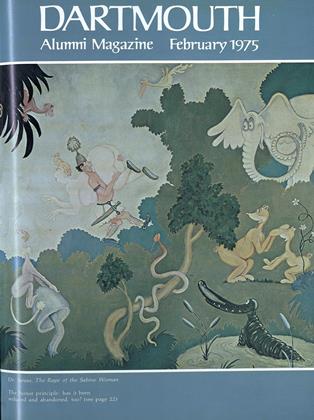Translated by Richmond Lattimore '26. Oxford University Press, 1973. 88 pp. $5.95.
No Dartmouth alumnus needs to ask, "Richmond who? or "Is he qualified as a scholar and poet to translate a play by Euripides?" but everyone is justified in-asking, "Is this translation of this play worth my spending time to read and money to buy?"
The excellence of the translation is at once apparent in the prologue. Euripides might almost be writing English, so precisely has Professor Lattimore reproduced Iphigeneia's account of her resue by Artemis and her flight to the land of the Taurians. The other long speeches and the scenes of line-by-line dialogue are written in both Greek and English with clarity and conciseness. The familiarity of the diction vividly contrasts with the strangeness of the myth.
For the poetry of the choral odes Lattimore has deferred to the artistry of Euripides and adopted his verbal techniques. Let us examine closely an ode described in the introduction as follows: "But the feeling of homesickness is most poignantly expressed by the captive women in the loveliest choral ode in the play (1067-1128)." "Ornis" or "Bird" - the first word emphasizes with honest directness the dominant image of flight. A Greek polysyllable becomes "slim-tressed" palm trees; Greek repetition becomes a repeated "longing for"; Greek alliteration is represented in "by the pool with its spiral stream / where the swan, the singer of songs, / ministers to the Muses." And how more effectively could homesickness be conveyed than by the simple line, "While I stay behind forsaken"?
The notes invite us into the translator's workshop where we can observe his mind confronting difficulties, choosing among textual readings and interpretations, evaluating other translations, and shedding light on obscurities.
This is not a play for the casual reader. In Professor Lattimore's own words, it is a "well- made, conventional play" and "not one of the deep ones, nor is it personal, or intense." However, it will have special interest for some and it does express a universal human longing to escape captivity and death and to return home. He calls it a "happy-ended" tragedy. If this puzzles you, you should read his introduction.
The book as an artifact is handsome, well designed in every part - jacket, cover, paper, and print. If all the plays in the series - Greek Tragedy in New Translations under the General Editor, William Arrowsmith - are comparable in quality, I recommend starting one's collection now.
A Greek scholar, author of an important bookabout Aristophanes, Professor Lever teachesEnglish at Wellesley College.
 View Full Issue
View Full Issue
More From This Issue
-
 Feature
FeatureStar Birth, Star Death, and Black Holes
February 1975 By DELO E. MOOK -
 Feature
FeatureHONOR: The Vanishing Principle
February 1975 By JAMES A.W.HEFFERNAN -
 Feature
FeatureThe Great Rip-off
February 1975 -
 Feature
FeatureSome People Are Good Skiers
February 1975 By V.F.Z. -
 Article
ArticleThe Gospel According to Marcus
February 1975 -
 Article
ArticleFurther Mention
February 1975 By J.H.
KATHERINE LEVER
-
 Books
BooksTHE ODYSSEY OF HOMER.
FEBRUARY 1968 By KATHERINE LEVER -
 Books
BooksPETER IN ROME. THE LITERARY, LITURGICAL, AND ARCHEOLOGICAL EVIDENCE.
JUNE 1969 By KATHERINE LEVER -
 Books
BooksTHE AMERICAN PRINCESS.
OCTOBER 1971 By KATHERINE LEVER -
 Books
BooksDOMESTIC FABLES.
MAY 1972 By KATHERINE LEVER -
 Books
BooksKAZANTZAKIS AND THE LINGUISTIC REVOL UTION IN GREEK LITERATURE.
JUNE 1973 By KATHERINE LEVER -
 Books
BooksTHE NOVELS OF JANE AUSTEN: AN INTERPRETATION.
March 1974 By KATHERINE LEVER
Books
-
 Books
BooksGUERNSEY CENTER MOORE FOUNDATION LECTURES
April, 1923 By FRANK MALOY ANDERSON -
 Books
BooksMANUAL ON RESEARCH AND REPORTS,
December 1937 By Harold J. Tobin 'l7 -
 Books
BooksFACULTY PUBLICATIONS
DECEMBER 1926 By Kenneth A. Robinson -
 Books
BooksTHE TELEPHONE BOOTH INDIAN
May 1942 By Kenneth A. Robinson -
 Books
BooksSubways Run on Time
May 1975 By MORTON M. KONDRACKE '60 -
 Books
BooksA PRIVATE STAIR
December 1950 By SIDNEY COX

